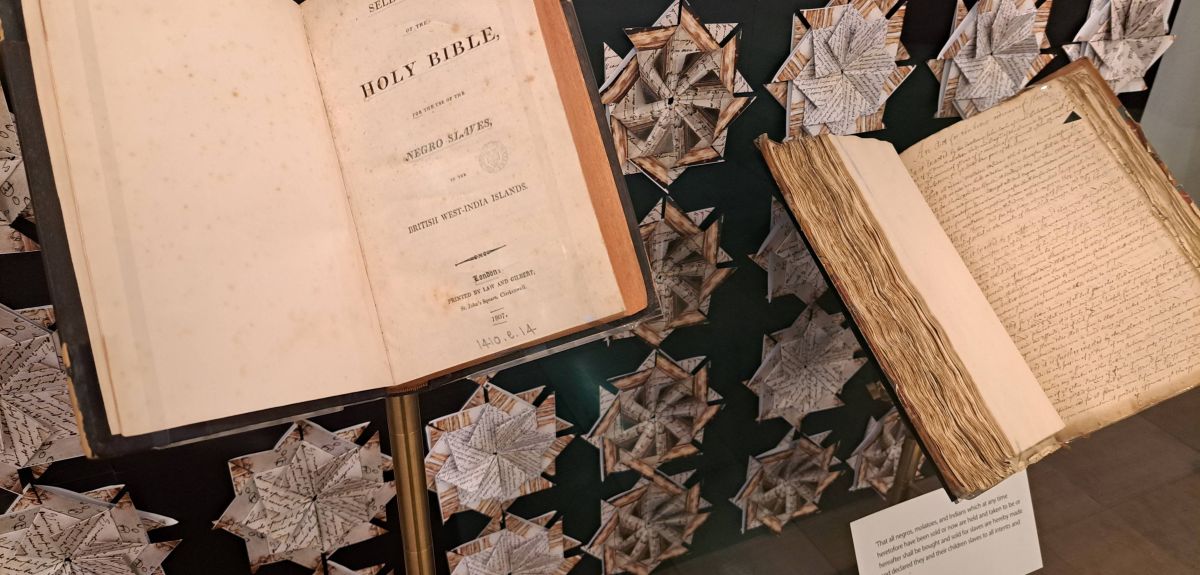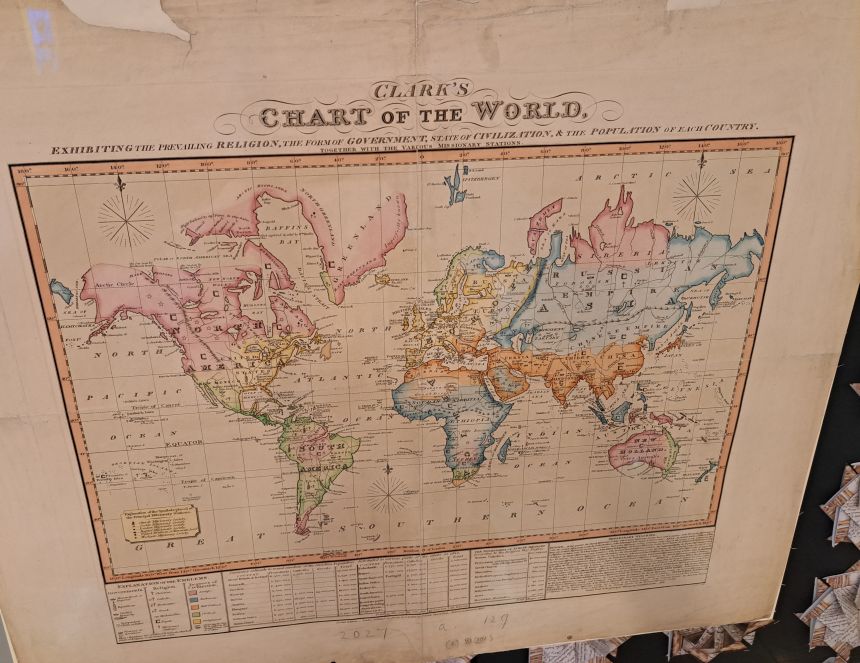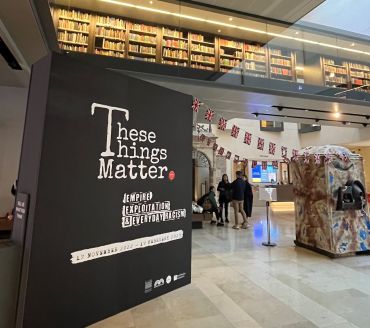
Artworks reflect on artefacts from the Bodleian Libraries’ colonial collections in a new exhibition
How much of our thinking is framed by our predecessors? And how much is our present behaviour informed by past actions? Some of the questions posed by These Things Matter at the Weston Library.
Contemporary artists have shared their thought-provoking responses to six artefacts from the Bodleian Libraries’ colonial collections for a new exhibition currently on display at the Weston Library.
These Things Matter: Empire, Exploitation and Everyday Racism explores how oppression can be normalised and invites visitors to consider ‘the ways in which our thinking has been framed by our predecessors, and present behaviour informed by past actions beyond our borders’.
Following a process of public workshops, seven artists selected by the Museum of Colour and Fusion Arts were invited to reflect on the artefacts.
 Grace Lee (SOME.GAL)
Grace Lee (SOME.GAL) In response, artist Grace Lee (SOME.GAL) explores ‘Who defines the savage but has permission to act savagely?’ In her video installation, viewers are asked to consider ‘The colonial urge’ and how maps help create the world.
Grace, a multidisciplinary artist and digital art curator from Sheffield, whose practice is experimental, says her first reaction to the chart was ‘anger and resignation’.
She continues: ‘These different civilisations of people were ranked to determine who to plunder. It demonstrated to me how racism is deliberately constructed and legitimised, firstly in the imaginings of the map’s creator and how this manifests in real world consequences.
I believe that the Bodleian is doing important and necessary work in making these items accessible to the public
Grace Lee (SOME.GAL)
‘The chart brought to mind Hannah Arendt and “banality of evil”; how wickedness can be illustrated in pretty pastels,’ adds Grace, referencing an expression coined by writer and philosopher Hannah Arendt after reporting on the war crimes trial of Nazi operative Adolph Eichmann.
‘My response went through many iterations. I knew I wanted to turn the anthropological gaze on the map’s creator and to speculate on their thought processes and urges in the colonising process. This evolved into exploring the mythology of whiteness as a key aspect of who appeared the most civilised.’
Collective imagination
Grace says news stories of the Windrush scandal were ever present in her mind when creating her work, how racism is normalised and legitimised. These parallels feature in her video. She says: ‘It raised many associations for me.
‘I hope viewers of my video will reflect upon how much of our thinking around borders and belonging is constructed and changes over time according to economic interest. How colonialism was not just manifested as physical violence but was full scale psychological operation in programming the collective imagination. This enabled the justification of plunder and exploitation of humans who were deemed lesser. Also, to realise that the celebration of the abolition of transatlantic slavery in Britain (as a noble example) often doesn't take into account that taxpayers were paying compensation to slave owners until 2015.
‘I believe that the Bodleian is doing important and necessary work in making these items accessible to the public, to learn about alternative narratives in British history and Empire that are often hidden. Truth is important to healing and reconciliation.’
 Clark’s Chart of the World (London, 1822)
Clark’s Chart of the World (London, 1822)Elsewhere in the exhibition, Nilupa Yasmin’s photographic sculpture responds to an ‘Act for the better ordering of slaves’. As well as being beautiful, these are ‘intricately folded pages filled with heinous words’ and also ‘expose the ill treatment of enslaved peoples and the harsh reality of our collective history’.
Another artefact is a censored version of the King James Bible, commonly known as the ‘Slave Bible’, published in the same year that the British slave trade was abolished.
Bunmi Ogunsiji’s video in response to the ‘Slave Bible’ includes excerpts from a letter written by the Right Honourable Rev Beilby Porteus, founder and president of the Society responsible for producing it. Select Parts of the Holy Bible for the use of the Negro Slaves in the British West-India Islands was a heavily redacted version which excluded certain parts believed to incite rebellion and revolt and instead emphasised parts which served to justify slavery and encourage obedience and servitude.
 See the exhibition at the Weston Library
See the exhibition at the Weston LibraryOther artists reflecting on artefacts in the exhibition are Amina Atiq, Dirty Freud, Mahdy Abo Bahat and Johannah Latchem.
These Things Matter: Empire, Exploitation and Everyday Racism continues until 19 February 2023. Blackwell Hall, Weston Library. Free admission.
Find out more: These Things Matter: Empire, Exploitation and Everyday Racism | Visit the Bodleian Libraries (ox.ac.uk)
 Existing hospital analysers offer a low-cost method to screen for fake vaccines
Existing hospital analysers offer a low-cost method to screen for fake vaccines